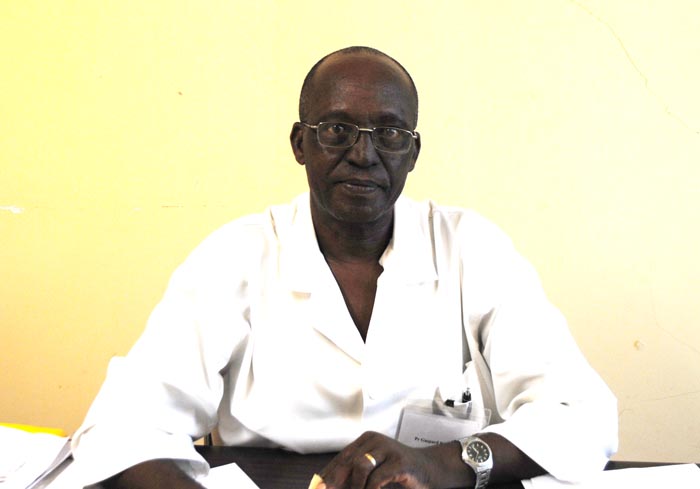Pneumonia, an infection that inflames air sacs in one or both lungs, can range from mild seriousness to life-threatening. Today, it is not always well treated in Burundi. Interview with Professor Gaspard Kamamfu Respirologist at ‘Roi Khaled’ Hospital.-By Joanna Nganda
What is the most common type of pneumonia in Burundi and what are its symptoms?
Pneumonia can be caused by viruses, fungi, or a bacterium called pneumococcus. The latter is the cause of the most frequently treated pneumonia in Burundi. This type of pneumonia mostly affects apparently healthy adults in good shape. In fact, you could meet a perfectly ‘healthy’ person in the morning then meet the same person few hours later with the alarming, specific symptoms of pneumonia like a very high fever, chills, difficulty in breathing, painful stitch in the side, sudden chest pain and an irritating cough at the beginning which will later produce sputum with or without pus.
How is the diagnosis made?
While examining the patient, the doctor will hear an unusual sound from the infected and painful lung which indicates that pneumonia has been contracted. In addition to this, the doctor will need laboratory examinations and chest radiography to see lesions on the infected lung; all this will be necessary to confirm that it is indeed pneumonia. When not treated well and in time, pneumonia can spread to the pleura (the membrane surrounding the lungs) and leave permanent problems. These will cause the patient to keep having symptoms (coughing, sputum…) long after pneumonia has gone.
What are the main causes of pneumonia?
Conditions like HIV, diabetes or even the flu for instance can trigger pneumonia because the body’s immune system is already weakened and the pneumococcus, an otherwise common germ, can start to multiply and expand to dangerous proportions. Also, bad habits can cause pneumonia: smoking and drinking heavily are other enabling factors. The smoker will increase the frequency of the pneumonia because cigarettes’ smoke paralyses the filtering function of the lung cilia (hair-like structures in constant motion). Since there is very little to no filtering, the germs will enter the lungs and multiply. Alcoholism adds insult to injury because it weakens the body’s immune system. Therefore, a smoker and heavy drinker is a very good candidate to pneumonia. It is very important to note that diabetes can trigger pneumonia when it is not well-balanced and treated. Patients with drepanocytose (also known as sickle cell disease, is a group of disorders that affects hemoglobin) are also likely to contract pneumonia.
What is the current situation of pneumonia in Burundi?
The type of pneumonia that is skyrocketing is pneumocystis, common among HIV positive patients who are immunodepressed individuals. This type of pneumonia is caused by a micro-organism present in the most part of the population and that can only lead to a pneumocystis when the CD4 lymphocyte count is particularly low.
Can you tell us more about the treatment of pneumonia? Is there any vaccine?
Yes, vaccination against the germ known as pneumococcus exists, but since the vaccines are quite expensive, they are reserved for vulnerable groups such as HIV patients, patients with drepanocytose or splenectomised patients (whose spleen has been excised). Even in developed countries vaccination is reserved for people with poor health. The most common type of pneumonia in Burundi is easy to treat. In fact, any antibiotic on the market can be very effective and inexpensive. The problem is the radiography which can only be made in few well-equipped hospitals.
If you manage to get radiographs, you need a good radiologist to interpret them and a good respirologist to treat the patients effectively. Unfortunately, Burundi lacks both. The other problem is self-medication because the patient rarely knows how to take the antibiotics. For the treatment to be effective, antibiotics require to be taken in a sufficient dose for a long and enough period of time. I do not approve of self-medication with pneumonia because it can worsen the infection and lead to complications and permanent problems we talked about earlier.




















 IWACU Open Data
IWACU Open Data

